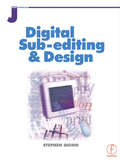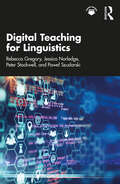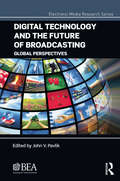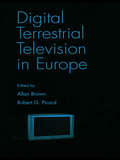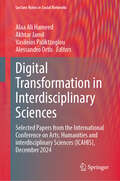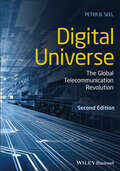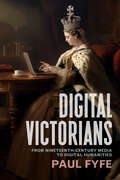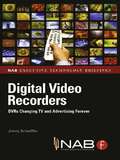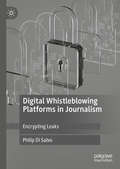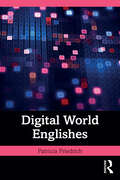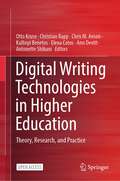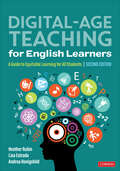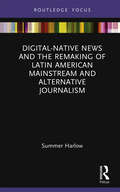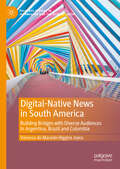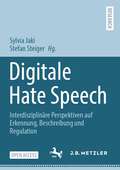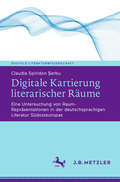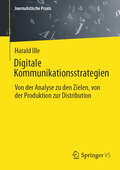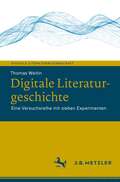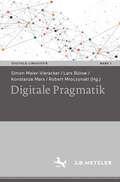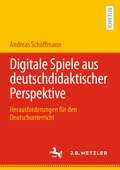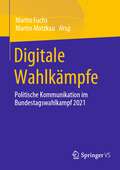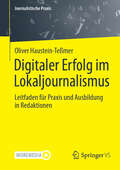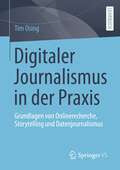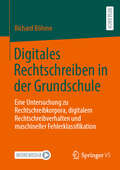- Table View
- List View
Digital Sub-Editing and Design
by Stephen QuinnThis excellent book covers editing in the digital age, demonstrating the tools needed for effective text editing. Learn how to write powerful headlines and captions, and how to edit body text quickly and cleanly. It also concentrates on design in the digital environment, introducing typography and the related issues of readability and legibility. The skills of picture editing are explored, including image selection, cropping, manipulation and the ethics involved. These core skills and methods are then applied to the World Wide Web. Recent research into how people navigate Web pages is considered, and recommends ways to write more effectively for the online medium. The first section concentrates on editing in the digital age, demonstrating the tools needed for effective text editing. Dr Quinn shows how to write powerful headlines and captions, and how to edit body text quickly and cleanly. The middle section concentrates on design in the digital environment. Chapter five introduces typography and the related issues of readability and legibility. Chapter six covers the principles of design and how they can be applied to print and electronic publications. Chapter seven looks at the skills of picture editing, including image selection, cropping, manipulation and the ethics involved. Chapter eight investigates other forms of visual presentation such as diagrams, logos, maps and cartoons. In the final section, these core skills and methods are applied to the World Wide Web. Chapter nine considers recent research into how people navigate Web pages, and recommends ways to write more effectively for the online medium. Chapter ten examines how the principles of print design can (and cannot) be applied to Web pages.
Digital Teaching for Linguistics
by Peter Stockwell Paweł Szudarski Rebecca Gregory Jessica NorledgeDigital Teaching for Linguistics re-imagines the teaching of linguistics in a digital environment. It provides both an introduction to digital pedagogy and a discussion of technologically driven teaching practices that could be applied to any field of study.Drawing on the authors’ extensive experience of successful delivery of web-based instruction and assessment, this book:• provides extended analysis and discussion of the best practices for teaching in an online and blended context;• features examples and case studies based on current research and teaching practice;• proposes new methods of teaching and assessment in line with innovations in educational technology.This book is essential reading for educators in the areas of linguistics, English language, and education seeking guidance and advice on how to design or adapt their teaching for a digital world.
Digital Technology and the Future of Broadcasting: Global Perspectives (Electronic Media Research Series)
by John V. PavlikThis volume presents timely discussions on how digital technology is reshaping broadcasting and the media in the United States and around the world. It features contributions from distinguished scholars and young researchers, representing work that spans domestic and international issues of technological change and the implications for broadcasting and related media in a global context. Among the many issues covered are: The impact of digital technology on the structure of broadcasting organizations and regulation; The nature of broadcast content or media programming and how it is delivered at home and abroad; Engagement and interaction of the public with broadcasting and social and mobile media; and The reshaping of revenue models for broadcasters and media organizations globally. The first two parts of the volume, addressing research challenges, issues, and advances in global broadcasting, are competitively reviewed research papers which were presented at the BEA2014 Research Symposium. The third part focuses on international perspectives, with chapters from broadcasting scholars and paper discussants at the Research Symposium. This section provides reflection on the problems and prospects for research, education, and public policy that arise in this era of rapid and continuing change. As a benchmark of the remarkable changes taking place in today’s media environment, the volume sets an agenda for future research on the implications of digital technology for broadcasting and broadcasting education.
Digital Terrestrial Television in Europe
by Robert G. Picard Allan BrownDigital technology for the production, transmission, and reception of television is expected to replace analogue transmission throughout the world. The timetable for this transition is uncertain and different projections have been made for virtually every country in the world. This book gives the exhaustive details of the issues of this changeover in Europe and elsewhere. The details are placed within the context of the massive changes, which the television industry has been subjected to over the past 25 years.The rollout of digital terrestrial television (DTTV) in Europe is a significant issue for every country included in this survey. It is of such importance because DTTV is the centerpiece of many governments' policies toward making Europe the world leader in new information and communication technologies. These same governments are all wrestling with the issues of how to use the technology in ways that create both commercial and non-commercial value. European perspectives on the social, cultural, and political nature of broadcasting vary significantly from those in other parts of the world and require that the introduction of DTTV should be handled differently to its introduction elsewhere.There are enormous technical, political, and economic aspects to be considered and these vary from country to country in Europe. The two editors bring a perspective to this study as media economists who come to the European scene from other parts of the world. The book covers DTTV in depth, and it also includes discussions of cable, satellite, broadband, and Internet technology for comparison.
Digital Transformation in Interdisciplinary Sciences: Selected Papers from the International Conference on Arts, Humanities and interdisciplinary Sciences (ICAHIS), December 2024 (Lecture Notes in Social Networks)
by Akhtar Jamil Alaa Ali Hameed Alessandro Ortis Vasileios PaliktzoglouThis proceedings volume discusses the transformative impact of AI, digital transformation, and data science across education, literature, linguistics, and interdisciplinary sciences. It delves into how AI-driven personalized learning, immersive virtual and augmented reality, and adaptive systems are reshaping education by fostering inclusivity, creativity, and innovative teaching methods. In literature and linguistics, the book highlights AI-assisted literary analysis, machine translation, and digital preservation, offering new perspectives on language patterns and storytelling. It also examines how AI is enhancing interdisciplinary research, promoting cross-disciplinary collaboration, and enabling data-driven insights in social sciences and the digital humanities. With a focus on ethical considerations and the integration of technology into diverse fields, this insightful collection is ideal for academics, professionals, and policymakers, bridging AI-driven innovation and practice to offer a holistic view of how technology is reshaping society across multiple domains.
Digital Universe: The Global Telecommunication Revolution
by Peter B. SeelAn illuminating examination of the benefits and drawbacks of global, digital communication In this newly revised Second Edition of Digital Universe: The Global Telecommunication Revolution, journalism and digital telecommunication expert Peter B. Seel delivers a fascinating and insightful exploration of digital communication technologies and their substantial effects on contemporary life. This book traces the evolution of digital information and communication tools used around the world, from undersea telegraph cables to the newest mobile phones. Digital Universe introduces readers to important inventors, scientists, artists, and thinkers in its discussions of the history and socio-cultural effects of technology adoption. It offers an accessible tour of the global digital universe and provides new perspectives and critical observations on mediated human communication. The book also includes: A thorough introduction to digital communication, the internet, and the origins of the world wide web Comprehensive explorations of telecommunication and media convergence, including the profound effects of the adoption of wired and wireless technologies worldwide Practical discussions of internet control, cyberculture, and dystopian views -- including online censorship, the loss of personal privacy, surveillance capitalism, increasing data hacks, and cyberwarfare The book introduces an original concept, the Tao of Technology, that encourages readers to adopt an enhanced worldview of informed ambivalence toward the diffusion of new telecommunication technologies A new chapter on artificial intelligence (A.I.) explores its application in global telecommunication and examines the biases introduced by its creators In-depth examinations of new technologies, including alternative digital realities such as virtual and augmented realties, and their potential effects on the future of digital communication Perfect for undergraduate and graduate students in journalism, technical communication, speech communication, technology history, sociology, anthropology, computer information systems, and education; it provides the latest data on innovations in telecommunication. The second edition of Digital Universe: The Global Telecommunication Revolution will be an invaluable resource for anyone with an interest in the evolution of the internet, new telecommunication technologies, communication privacy and surveillance, the rise of social media, and the consequences of the diffusion of information and communication technologies.
Digital Victorians: From Nineteenth-Century Media to Digital Humanities (Stanford Text Technologies)
by Paul FyfePerhaps no period better clarifies our current crisis of digital information than the nineteenth century. Self-aware about its own epochal telecommunications changes and awash in a flood of print, the nineteenth century confronted the consequences of its media shifts in ways that still define contemporary responses. In this authoritative new work, Paul Fyfe argues that writing about Victorian new media continues to shape reactions to digital change. Among its unexpected legacies are what we call digital humanities, characterized by the self-reflexiveness, disciplinary reconfigurations, and debates that have made us digital Victorians, so to speak, struggling again to resituate humanities practices amid another technological revolution. Engaging with writers such as Thomas De Quincey, George Eliot, George du Maurier, Henry James, and Robert Louis Stevenson who confronted the new media of their day, Fyfe shows how we have inherited Victorian anxieties about quantitative and machine-driven reading, professional obsolescence in the face of new technology, and more—telling a longer history of how writers, readers, and scholars adapt to dramatically changing media ecologies, then and now. The result is a predigital history for the digital humanities through nineteenth-century encounters with telecommunication networks, privacy intrusions, quantitative reading methods, remediation, and their effects on literary professionals. As Fyfe demonstrates, well before computers, the Victorians were already digital.
Digital Video Recorders: DVRs Changing TV and Advertising Forever
by Jimmy SchaefflerFour specific trends are driving the DVR industry: consumer content choice, consumer content control, personalization of content libraries, and the ability to transfer content from device-to-device and person-to-person. "Digital Video Recorders" features a macro and micro views of the already established yet still burgeoning DVR industry. As part of the NAB Executive Technology Briefing series, this book gives you a wealth of market knowledge, business models, case studies, and industry insignts explained in a non-technical fashion. "Digital Video Recorders" discusses the impact of the technology across many different industries and platforms, explains hardware, software and technology of set-top boxes, DVR infrastructure, on-screen guides, planning and scheduling, content security, and more. Whether you are an executive in the broadcast, telecommunications, consumer electronic, or advertising space, you will expand your knowledge on DVR impact, explore new business opportunities, and get a brief overview of the technical terms needed. You will also be able to accurately analyze and understand the trends, projections and other data, all of which will help lead to the expedited growth and development of DVR industry.
Digital Whistleblowing Platforms in Journalism: Encrypting Leaks
by Philip Di SalvoThis book analyzes whistleblowing platforms and the adoption of encryption tools in journalism. Whistleblowing platforms are becoming an important phenomenon for journalism in this era and offer safer solutions for communicating with whistleblowers and obtaining leaks. WikiLeaks and the Snowden case have been powerful game changers for today’s journalism, showing the potentials of and needs for encryption for journalistic purposes, together with the perils of surveillance. Whistleblowing platforms are also an interesting example of journalists and hackers coming together to support investigations with new tools and practices. The book introduces this phenomenon and features a qualitative study about whistleblowing platforms and their adoption in the journalistic field.
Digital World Englishes (Language and Digital Media)
by Patricia FriedrichDigital World Englishes aims to be an introduction to and exposition of the universe of world Englishes as represented in online spaces. It presents aspects of world Englishes theory in relation to our evolving digital reality and examples of authentic language variation, change, and code-mixing. To do that, it visits such stations as world Englishes frameworks, pedagogy, new media, augmented intelligence, interactions with other languages, research methodology, and Internet user identities. The reader of the book will come away from the reading with a clear idea of what world Englishes are and how they have morphed, adapted, and come to manifest in online environments. This is likely the first book-length treatment of this topic from the lenses of linguistic creativity, morphing identities, and the power of languages of wider communication.
Digital Writing Technologies in Higher Education: Theory, Research, and Practice
by Chris M. Anson Christian Rapp Elena Cotos Otto Kruse Kalliopi Benetos Ann Devitt Antonette ShibaniThis open access book serves as a comprehensive guide to digital writing technology, featuring contributions from over 20 renowned researchers from various disciplines around the world. The book is designed to provide a state-of-the-art synthesis of the developments in digital writing in higher education, making it an essential resource for anyone interested in this rapidly evolving field.In the first part of the book, the authors offer an overview of the impact that digitalization has had on writing, covering more than 25 key technological innovations and their implications for writing practices and pedagogical uses. Drawing on these chapters, the second part of the book explores the theoretical underpinnings of digital writing technology such as writing and learning, writing quality, formulation support, writing and thinking, and writing processes. The authors provide insightful analysis on the impact of these developments and offer valuable insights into the future of writing. Overall, this book provides a cohesive and consistent theoretical view of the new realities of digital writing, complementing existing literature on the digitalization of writing. It is an essential resource for scholars, educators, and practitioners interested in the intersection of technology and writing.
Digital-Age Teaching for English Learners: A Guide to Equitable Learning for All Students
by Lisa M. Estrada Andrea Honigsfeld Heather RubinBridge the Digital Divide with Research-Informed Technology Models Since the first edition of this bestselling resource many schools are still striving to close the digital divide and bridge the opportunity gap for historically marginalized students, including English learners. And the need for technology-infused lessons specifically aligned for English learners is even more critically needed. Building from significant developments in education policy, research, and remote learning innovations, this newly revised edition offers unique ways to bridge the digital divide that disproportionally affects culturally and linguistically diverse learners. Designed to support equitable access to engaging and enriching digital-age education opportunities for English learners, this book includes Research-informed and evidence-based technology integration models and instructional strategies Sample lesson ideas, including learning targets for activating students’ prior knowledge while promoting engagement and collaboration Tips for fostering collaborative practices with colleagues Vignettes from educators incorporating technology in creative ways Targeted questions to facilitate discussions about English language development methodology Complete with supplementary tools and resources, this guide provides all of the methodology resources needed to bridge the digital divide and promote learning success for all students.
Digital-Age Teaching for English Learners: A Guide to Equitable Learning for All Students
by Lisa M. Estrada Andrea Honigsfeld Heather RubinBridge the Digital Divide with Research-Informed Technology Models Since the first edition of this bestselling resource many schools are still striving to close the digital divide and bridge the opportunity gap for historically marginalized students, including English learners. And the need for technology-infused lessons specifically aligned for English learners is even more critically needed. Building from significant developments in education policy, research, and remote learning innovations, this newly revised edition offers unique ways to bridge the digital divide that disproportionally affects culturally and linguistically diverse learners. Designed to support equitable access to engaging and enriching digital-age education opportunities for English learners, this book includes Research-informed and evidence-based technology integration models and instructional strategies Sample lesson ideas, including learning targets for activating students’ prior knowledge while promoting engagement and collaboration Tips for fostering collaborative practices with colleagues Vignettes from educators incorporating technology in creative ways Targeted questions to facilitate discussions about English language development methodology Complete with supplementary tools and resources, this guide provides all of the methodology resources needed to bridge the digital divide and promote learning success for all students.
Digital-Native News and the Remaking of Latin American Mainstream and Alternative Journalism (Disruptions)
by Summer HarlowDigital-Native News and the Remaking of Latin American Mainstream and Alternative Journalism explores the rise of independent, digital-native news outlets in Latin America and their role in social change, protest participation, and the refinement of the concept of "alternative" media. Drawing upon a decade of original research, including interviews, surveys, focus groups, and content analyses, this book questions how the emergence of online-native news sites in Latin America is redefining our understanding of what it means to be mainstream and what it means to be alternative. By analyzing a wide range of elements, from business models and audience behaviors to social media use and the role of gender, this text examines how these sites are challenging traditional, hegemonic mainstream news media and its service to political and economic elites. The result is a discerning investigation into the new brand of journalism these sites have innovated. This insightful study will be of interest to journalism, communication, and Latin American scholars, particularly those interested in how technology is moulding journalistic practices and changing conceptions of journalism itself.
Digital-Native News in South America: Building Bridges with Diverse Audiences in Argentina, Brazil and Colombia (Palgrave Studies in Journalism and the Global South)
by Vanessa de Macedo Higgins JoyceThis book investigates the strategies used by South American digital-native news media in attracting diverse audiences, and their effectiveness, from an audience perspective, in bridging communities and building consensus.In recent years, independent digital news outlets have emerged in a landscape of increasing ideological polarization. The book addresses the pivotal question of whether these organizations can help promote social cohesion and overcome a divided and fragmented market. Drawing from extensive interviews conducted with audience members, journalists, and media executives from the established news markets of Argentina, Brazil and Colombia, de Macedo Higgins Joyce sheds new theoretical insights on the strategies and practice of independent digital news, its evolution, and its agenda-setting impact in the region.Innovative and rigorous, Digital-Natives News in South America deftly explores this new and important field of research and will be of interest to journalism researchers and media practitioners alike.
Digitale Hate Speech: Interdisziplinäre Perspektiven auf Erkennung, Beschreibung und Regulation
by Stefan Steiger Sylvia JakiIn diesem Open-Access Buch wird Hate Speech (oder synonym Hassrede) im Internet interdisziplinär diskutiert. Die Beiträge, die aus den Bereichen Linguistik, Sprachtechnologie, Informationswissenschaft und Politikwissenschaft stammen, beleuchten zentrale Fragen im Zusammenhang mit diesem Phänomen. Hierzu zählen aus sprachwissenschaftlicher Sicht zunächst die vielfältigen direkten und indirekten Erscheinungsformen von Hate Speech und ihre Rezeption. Aus informationswissenschaftlicher und computerlinguistischer Sicht wird der Forschungsstand in Bezug auf verschiedene maschinelle Verfahren zur automatischen Erkennung von Hate Speech wiedergegeben. Überdies wird erläutert, wie solche Verfahren evaluiert werden können. Daher stellt sich aus politikwissenschaftlicher Sicht nicht nur die Frage, wie digitale Hassrede derzeit reguliert wird und wie sich diese Regulierungsverfahren künftig entwickeln könnten, sondern auch, wie die automatische Erkennung reguliert werden müsste.
Digitale Kartierung literarischer Räume: Eine Untersuchung von Raum-Repräsentationen in der deutschsprachigen Literatur Südosteuropas (Digitale Literaturwissenschaft)
by Claudia Spiridon ȘerbuDas Buch präsentiert eine mathematische Leseart des literarischen Raums, die als Werkzeug benutzt wird, um die Verflechtungen von Raum, Zeit, Thematik, Handlungsverlauf, Figurenkonstellation und Erzählperspektive in interkulturellen Romanen kartographisch zu untersuchen. Im Mittelpunkt des Projekts steht eine Datenbank von dreiundsiebzig Romanen, die nach 1990 veröffentlicht wurden und unter dem Begriff Eastern European turn in der deutschsprachigen Literatur subsumiert wurden.
Digitale Kommunikationsstrategien: Von der Analyse zu den Zielen, von der Produktion zur Distribution (Journalistische Praxis)
by Harald IlleStrategie ist, es anders zu machen als alle anderen. Wenn digitale Kanäle geflutet werden mit heterogenen Angeboten, dann bringt ein „Mehr vom Gleichen&“ niemanden weiter. Strategische Kommunikation versucht daher, zu verstehen: Wie ticken unsere Zielgruppen, und für welche Themen und Inhalte interessieren sie sich wann und warum? Wie sind ihre Bedürfnisse, und haben wir ausreichend passgenaue Inhalte für sie? Strategie-Modelle wie 3H, SCOM und der Content Strategy Quad helfen, genau die passenden Themen zu finden – also schauen wir sie uns an. Am Ende soll digitale Kommunikation auch ihren Beitrag zur Wertschöpfung des Unternehmens leisten. Welche Modelle und Metriken helfen in der Praxis, effektiver und effizienter digital zu kommunizieren? Das Praxishandbuch folgt dem POST-Modell von Bernoff und Li, um diese Frage strukturiert zu beantworten: Wer kommuniziert für wen mit welchen Zielen? Welche Funktion hat welcher Content und wie entsteht die optimale Themenarchitektur? Und schließlich: Wie hilft Technologie, diesen Content zu distribuieren?
Digitale Literaturgeschichte: Eine Versuchsreihe mit sieben Experimenten (Digitale Literaturwissenschaft)
by Thomas WeitinMit digitalen Methoden sehen wir die Literaturgeschichte vollständig – Analysen großer Textmengen konfrontieren den gelehrten Kanon meist männlicher Autoren mit Werken, die das kulturelle Gedächtnis verdrängt hat. Viele von ihnen stammen von Frauen. Digitale Literaturgeschichte erläutert Methoden zum Vergleich weiblichen und männlichen Schreibens, die von der Stilometrie über maschinelles Lernen bis zur Netzwerkanalyse reichen, und zeigt, warum viele Autorinnen in Vergessenheit geraten sind. Alle Daten und Code-Dateien werden zur Verfügung gestellt – so entsteht Literaturgeschichte zum Mitmachen.
Digitale Pragmatik (Digitale Linguistik #1)
by Konstanze Marx Simon Meier-Vieracker Lars Bülow Robert MroczynskiDie Digitalisierung betrifft auch die linguistische Pragmatik. In den digitalen Medien lassen sich vielfältige Sprachgebrauchsphänomene beobachten, die mit den einschlägigen pragmatischen Konzepten theoretisch modelliert und empirisch untersucht werden können. Auch finden digitale Forschungsmethoden zunehmend in pragmatischen Forschungskontexten Anwendung, etwa korpuslinguistische Zugriffe im Rahmen der Korpuspragmatik. Die Beiträge des Bandes zeigen, wie die Hinwendung der linguistischen Pragmatik zu digitalen Gegenständen und digitalen Methoden die pragmatische Theorie und Methodologie in vielerlei Hinsicht neu konturiert.
Digitale Spiele aus deutschdidaktischer Perspektive: Herausforderungen für den Deutschunterricht
by Andreas SchöffmannAndreas Schöffmann stellt in dem vorliegenden Buch die Frage „Was haben Computerspiele im Deutschunterricht zu suchen?“ vom Kopf auf die Füße. Er zeigt, was das Fach Deutsch aus seiner spezifischen Perspektive beitragen kann, um Heranwachsenden Bildungsmomente beim Spielen am Computer zu ermöglichen. Die Analyse bietet damit in mehrfacher Hinsicht Perspektivwechsel an, um digitale Spiele als wertvolle Bildungsmedien wahrnehmbar zu machen, die sich positiv auf den Medienkompetenzerwerb sowie die Identitäts- und Werteentwicklung auswirken.
Digitale Wahlkämpfe: Politische Kommunikation im Bundestagswahlkampf 2021
by Martin Fuchs Martin MotzkauDer Sammelband beleuchtet die verschiedenen Folgen zunehmender digitaler Wahlkämpfe anhand der Bundestagswahl 2021 für Politik, Journalismus und Gesellschaft. Darüber hinaus ermöglichen die Erkenntnisse einen Blick in die Zukunft des digitalen Campaignings. Der digitale Wandel und die damit verbundenen Möglichkeiten für die politische Kommunikation werden die Wahlkämpfe der Zukunft immer stärker beeinflussen.Politische Challenges auf TikTok, Begleitung der TV-Trielle auf Twitter oder Haustürgespräche in der Dating-App – ein Wahlkampf ohne digitale Plattformen und Formate ist heute undenkbar. Entsprechend erhöhen Parteien, Spitzenkandidat*innen und andere politische Akteure ihre Budgets für den Online-Wahlkampf und professionalisieren Personal und Strukturen, um die Wähler*innen noch effizienter zu erreichen und zu mobilisieren. Im Bundestagswahlkampf 2021 beschleunigte die Corona-Pandemie diesen Trend, da traditionelle Wahlkampfveranstaltungen auf Marktplätzen oder in Hallen aufgrund der Maßnahmen zur Bekämpfung des Virus kaum möglich waren. Die Parteien und Kandidat*innen waren noch stärker auf digitale Plattformen angewiesen und die Strategien entsprechend detailreicher als in den Jahren zuvor.
Digitaler Erfolg im Lokaljournalismus: Leitfaden für Praxis und Ausbildung in Redaktionen (Journalistische Praxis)
by Oliver Haustein-TeßmerDieses Buch hilft Führungskräften und Mitarbeitenden in Redaktionen, digitale Werkzeuge erfolgreich anzuwenden. Es richtet sich an erfahrene und neu einsteigende Journalistinnen und Journalisten. Im Fokus stehen dringende Fragen der digitalen Transformation: Wie erreichen lokale Medien mehr und jüngere Menschen? Wie gewinnen und halten regionale Verlage Abonnentinnen und Abonnenten online? Die Leserinnen und Leser lernen, welche Strategien eine digitale Arbeitsweise befördern. Der Leitfaden erläutert datenorientiertes Planen und Produzieren sowie die Arbeit mit Zielgruppen und deren Bedürfnissen (User Needs). Checklisten, Grafiken und Tabellen sorgen für Übersicht. Es gibt viele Praxisbeispiele; Interviews mit Fachleuten bieten zusätzliche Einblicke. Der Autor geht auf Trends wie konstruktiven Journalismus ein und zeigt, wie journalistische Qualität mit dem Einsatz generativer Künstlicher Intelligenz vereinbar ist. Ein Schwerpunkt liegt auf Karrierechancen und Ausbildung. Dabei berücksichtigt der Autor sowohl die Perspektive journalistischer Talente als auch die veränderten Anforderungen an Volontariate und ausbildende Medienunternehmen. Ziel ist es zu zeigen, wie vielfältig Journalismus als Beruf in der digitalisierten Gesellschaft wirken kann. Per App: einfach die SN More Media App kostenfrei herunterladen, ein Bild oder einen Link mit dem Play-Button scannen und sofort die Videos auf Smartphone oder Tablet ausspielen.
Digitaler Journalismus in der Praxis: Grundlagen von Onlinerecherche, Storytelling und Datenjournalismus
by Tim OsingDieses Lehrbuch vermittelt die besonderen Möglichkeiten des digitalen Journalismus. Es erklärt mit großem Praxisbezug und vielen Beispielen digitales Storytelling, zeigt Techniken des Datenjournalismus und liefert Tipps und Tools für die Recherche im Internet. Um einer digitalisierten Welt gerecht werden zu können, müssen Journalist*innen sich dieses Handwerk aneignen – und es intuitiv einsetzen können, da im hektischen Alltag einer Online-Redaktion nicht viel Zeit bleibt. Wer Open Data richtig nutzen, Geschichten multimedial erzählen und Fakten zügig überprüfen kann, hebt sich im Internet und den sozialen Medien entscheidend ab.
Digitales Rechtschreiben in der Grundschule: Eine Untersuchung zu Rechtschreibkorpora, digitalem Rechtschreibverhalten und maschineller Fehlerklassifikation
by Richard BöhmeDer Erwerb der Rechtschreibung ist eine äußerst anspruchsvolle Aufgabe. Digitale Medien haben das Potenzial, Schüler*innen dabei durch adaptive Angebote zu unterstützen. Voraussetzung dafür sind Machine-Learning-Verfahren, die Rechtschreibfehler von Schüler*innen zuverlässig klassifizieren. Allerdings bestehen in diesem Zusammenhang einige Entwicklungs- und Forschungsdesiderate. Die folgenden wurden adressiert: Zunächst wurden gängige Grund- und Orientierungswortschätze einer umfassenden Korpusanalyse unterzogen. In den Ergebnissen zeigt sich, dass zwar ein Großteil der Wörter graphematisch, aber nur ein Bruchteil rein phonematisch herzuleiten ist. Unter Verwendung der analysierten Wörter und einer eigens entwickelten Rechtschreib-App wurde das digitale, prozessbezogene Rechtschreibverhalten von Schüler*innen mit hoher und niedriger Rechtschreibkompetenz untersucht. Die Ergebnisse machen deutlich, dass sich die Schüler*innen u.a. in ihrer Fehlersensibilität, ihrer aktiven Auseinandersetzung mit Fehlerkorrekturen und ihrem systematischen Vorgehen beim Hypothesentesten unterscheiden. Die fehlerhaften Verschriftungen der Schüler*innen wurden wiederum dafür genutzt, um Machine-Learning-Algorithmen zu trainieren. Die Evaluation zeigt, dass Rechtschreibfehler damit äußerst zuverlässig klassifiziert werden können.
